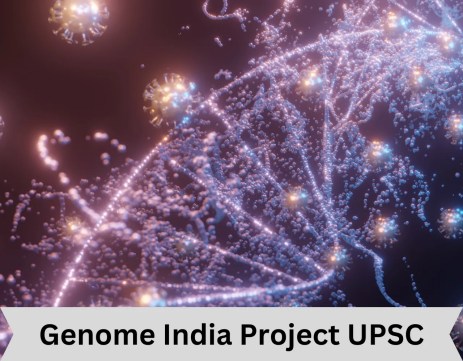
Source: The post Benefits and Challenges of the Genome India Project has been created, based on the article “Decoding the script: Findings from the genome sequencing must be shared widely” published in “The Hindu” on 2nd March 2024.
UPSC Syllabus Topic: GS Paper 3 – Awareness in the fields of IT, Space, Computers, Robotics, Nanotechnology, Biotechnology.
News: The article discusses the Genome India Project, which sequenced 10,000 Indian genomes to create a reference for Indian DNA. Genome India Project UPSC
What is the Genome India Project?
The Genome India Project, backed by the Department of Biotechnology, is a significant scientific initiative that has successfully sequenced the complete genomes of 10,000 Indian individuals. This project aims to construct a comprehensive reference for the Indian human genome.
For information on Genome India Project read article1, article 2
What are the benefits of the Genome India Project?
Creation of a Reference Genome: The project has sequenced 10,000 Indian genomes, creating a crucial reference for understanding the genetic diversity in India.
Disease Research: It aids in identifying genetic links to diseases. For instance, the discovery of the MYBPC3 genetic variant, prevalent in 4% of Indians, is associated with heart failure.
Personalized Medicine: The findings can lead to tailored healthcare solutions based on genetic information.
Understanding Genetic Complexity: It sheds light on the unique genetic makeup due to India’s diverse population and endogamy practices, helping in future genetic research and healthcare planning.
What are the challenges faced by the Genome India Project?
Representative Diversity: Sequencing 10,000 genomes is not fully representative of India’s over one billion diverse population, which includes around 4,500 population groups.
Complex Genetic Landscape: India’s history of endogamy within castes has preserved rare, potentially harmful genetic variants, complicating genetic analysis.
Monogenic Disease Focus Limitations: Most diseases are not monogenic (caused by a single gene), challenging the simplification of genetic research to direct disease links.
Affordability of Treatments: Even when genetic causes of diseases are identified, treatments, if available, are often too expensive for many who need them.
Data Accessibility: Ensuring that the project’s findings are widely accessible and not confined to academic circles is a significant challenge.
Way forward
To progress, Genome India should sequence more than 10,000 genomes, reflecting India’s diverse population. The project must engage various experts, including scientists, students, and ethicists, ensuring findings are not confined to academia. This approach will deepen India’s self-understanding and foster broader applications of the research.
Question for practice:
Evaluate the Genome India Project’s approach and accomplishments in sequencing 10,000 Indian genomes and discuss the challenges it faces and potential strategies for further progress.






